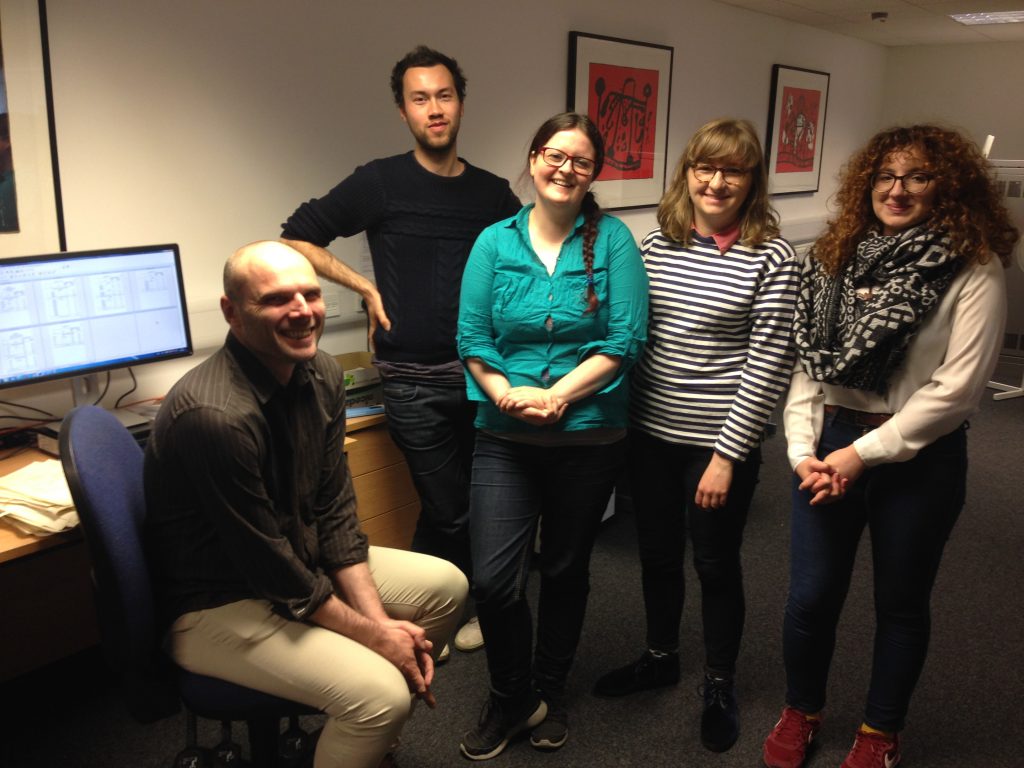We’re now almost two month’s into the PhD thesis digitisation project. Find out a bit more about the project digitisation team below!

The Project Digitisation team: Michael, Paul, Fiona, Aoife , Giulia
Fiona
I am Fiona Mowat and I have worked at Edinburgh University since 2009 in various different capacities, including as a Shelving Assistant and as a Rare Books Cataloguing intern. Having recently completed my PhD in Roman Art and Archaeology, I am keen to expand my knowledge in the fields of Library and Museum Collections and in particular Digitisation – this connects to my archaeological fieldwork experience and speciality in finds processing and imaging.
I love to catalogue and really enjoy enabling library users to discover material that they had no idea existed. It is great, in this role, to preserve other people’s PhD theses in an electronic form so that their research is discoverable and will continue to make a scholarly impact many years or decades on!
Aoife
I studied English and History in University College Cork and later pursued a Master’s degree in Eighteenth-Century Literature and Society at the University of Edinburgh, from which I graduated last year. Throughout my studies I benefited hugely from digital collections, be it an eighteenth-century travel guide or a student magazine from the early twentieth century. During my studies I worked in different roles in different libraries, handling material as diverse as ephemera from the recent independence referendum to musical instrument mouthpieces.
The theses we are working with are equally diverse, ranging from polar exploration to potato tubers (a surprisingly popular topic), I am excited to be part of the team digitising this diverse and fascinating collection.
Giulia
I have always (academically and professionally) worked closely with heritage and library collections. Before starting this post at here at the University, I worked at the National Galleries of Scotland as a digitisation assistant, seconded at the National Library of Scotland and volunteered for a variety of cultural organisations.
Digitisation gives you the unique opportunity to work with both the physical and digital items; it exposes you to the breadth, uniqueness and heterogeneity of the collection. I am looking forward to understanding what collections and artefacts, such as PhD theses, can tell us about, not only academic subjects, but also practices of the university, topic-trends and gender.
So far we have digitised all sorts of work, from thesis on the chemical qualities of potatoes to ones on the evolution of foot-binding in China. A particular favourite of mine is Raymond Mills’s ‘The Effect of Urbanisation on Health in Sierra Leone’ from 1962, as it contains maps and rare photographs of Sierra Leone’s landscape.
Paul
My name is Paul and this is my first post for the University of Edinburgh. Being a graduate from the University of Glasgow, my MSc was in Information Management and Preservation, which makes a snappy abbreviation of IMP. IMP is actually an Archives and Records Managements qualification, HATTI at the School of Humanities had the foresight a few years ago to include digital preservation into the course. This naturally involves many aspects of digitisation. Particularly relevant to this project was the 2D digitisation module.
Considering the move towards digitisation replacing traditional cataloguing work, or absorbing it, what is interesting is how Edinburgh University will utilise these digitisation workflows developed in this project for future work.
Michael
I’ve arrived at the Digitisation Project having spent six years within the University Library, working in various teams and on different projects in the Main Library and other sites. The project is different as rather than working with what’s already there, we’re seeing new technologies arrive and the job start to build around them.
